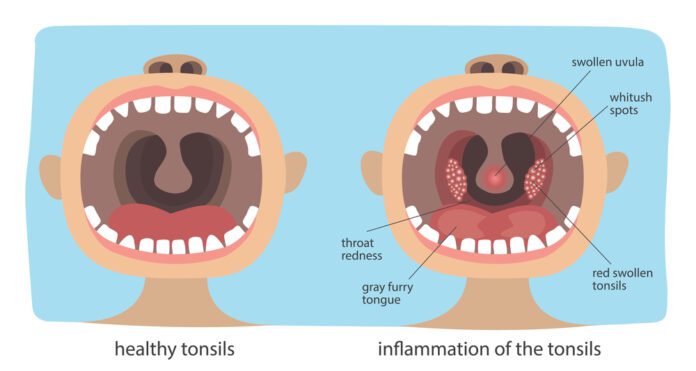Overview Of Sore Throat – Tonsillitis
Sore Throat – Tonsillitis is inflammation (swelling) of the tonsils.
Causes Of Sore Throat – Tonsillitis
The tonsils are lymph nodes in the back of the mouth and top of the throat. They help to filter out bacteria and other germs to prevent infection in the body.
A bacterial or viral infection can cause tonsillitis. Strep throat is a common cause. The infection may also be seen in other parts of the throat. One such infection is called pharyngitis.
Tonsillitis is very common in children.
Symptoms
Common symptoms of sore throat – tonsillitis may be:
- Difficulty swallowing
- Ear pain
- Fever and chills
- Headache
- Sore throat, which lasts longer than 48 hours and maybe severe
- Tenderness of the jaw and throat
Other problems or symptoms of sore throat – tonsillitis that may occur are:
- Problems breathing, if the tonsils are very large
- Problems eating or drinking
Exams & Tests
Your health care provider will look in the mouth and throat.
- The tonsils may be red and may have white spots on them.
- The lymph nodes in the jaw and neck may be swollen and tender to the touch.
- A rapid strep test can be done in most providers’ offices. However, this test may be normal, and you can still have strep. Your provider may send the throat swab to a laboratory for a strep culture. Test results can take a few days.
Treatment Of Sore Throat – Tonsillitis
Swollen tonsils that are not painful or do not cause other problems do not need to be treated. Your provider may not give you antibiotics. You may be asked to come back for a checkup later.
If tests show you do have strep, your provider will give you antibiotics. It is important to finish all of your antibiotics as directed, even if you feel better. If you do not take them all, the infection can return.
The following tips may help your sore throat – tonsillitis feel better:
- Drink cold liquids or suck on fruit-flavored frozen bars.
- Drink fluids, and mostly warm (not hot), bland fluids.
- Gargle with warm salt water.
- Suck on lozenges (containing benzocaine or similar ingredients) to reduce pain (these should not be used in young children because of the choking risk).
- Take over-the-counter (OTC) medicines, such as acetaminophen (Tylenol) or ibuprofen to reduce pain and fever. DO NOT give a child aspirin. Aspirin has been linked to Reye syndrome.
- Some people who have repeated sore throat – tonsillitis infections may need surgery to remove the tonsils (tonsillectomy).



